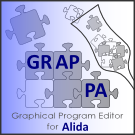Main Page: Difference between revisions
No edit summary |
|||
| Line 38: | Line 38: | ||
<div style="padding: 0.3em 1em 0.7em 1em;"> | <div style="padding: 0.3em 1em 0.7em 1em;"> | ||
'''How to get Alida?'''<br> | '''How to get Alida?'''<br> | ||
* | * You can download Alida 2.6 [[Downloads | here]]. <br/> | ||
You can find the API documentation for this release [http://www.informatik.uni-halle.de/alida/api/index.html here].<br/> | * You can find the API documentation for this release [http://www.informatik.uni-halle.de/alida/api/index.html here].<br/> | ||
* Alida offers you a user and programmer guide<br> which you can download [http://www2.informatik.uni-halle.de/agprbio/alida/api/java/index.html here]. | |||
</div> | </div> | ||
</div> | </div> | ||
Revision as of 16:03, 22 January 2016
Alida - Advanced Library for Integrated Development of Data Analysis Applications
...formerly known as Alida - Automatic Logging of Process Information in Data Analysis
|
What is Alida? The Alida concept is independent of a specific programming language, however, relies on an object-oriented design. Moreover, in particular Java renders it quite easy to implement the conceptual features of Alida due to its reflection and annotation mechanisms. Consequently currently there is only active maintenance and support for the Java implementation of the concept. A prototypical C++ implementation is also available, however, still lacks a lot of features and is in general at a rather early stage. The Java implementation of the Alida concept is in a quite mature state. It provides a framework for implementing and running operators. It also includes automatic process documentation and automatically generated command line and graphical user interfaces. Calls to operators not only produce data analysis results, but are at the same time registered within the framework together with all input and output objects as well as parameters settings of the various operators. These data acquired during an analysis process and the order of operator calls form a directed graph datastructure containing all relevant information for later reconstruction or verification of the analysis procedure. The Java implementation of Alida allows to make the directed graph datastructure explicit in terms of XML representations which can be visually explored with appropriate graphical frontends like Chipory, or might be stored in data bases for archival purposes.
Grappa 
|
Latest News
The news archive can be found here.
Licensing information
Bug reports & Feature requests |